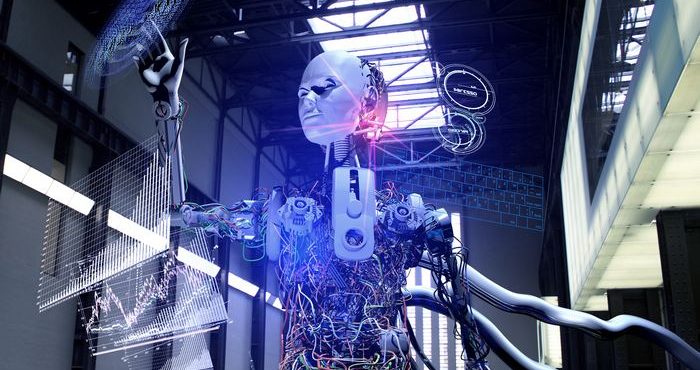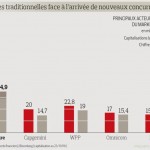Where Is AI Headed in 2018?
13 predictions by researchers and experts from around the world.
Publications like The Wall Street Journal, Forbes and Fortune have all called 2017 “The Year of AI.” And with good reason.
AI outperformed professional gamers and poker players in new realms. Access to deep learning education expanded through various online programs. The speech recognition accuracy record was broken multiple times, most recently by Microsoft. And research universities and organizations like Oxford, Massachusetts General Hospital and GE’s Avitas Systems invested in deep learning supercomputers.
These are a few of many milestones in 2017. So what’s next?
We’ve gathered predictions from the world’s leading researchers and industry thought leaders.
AI Will Become Real for Medicine
“2018 will be the year AI becomes real for medicine. We’re going to move from algorithms to products and think more about integration and validation, so that these solutions can move from concepts to real, tangible solutions for our doctors. By the end of next year, I think around half of leading healthcare systems will have adopted some form of AI within their diagnostic groups. And while a lot of this adoption will happen first in the diagnostic medical specialties, we’re seeing solutions for population health, hospital operations and a broad set of clinical specialties quickly follow behind. In 2018, we’ll begin the adoption of a technology that may truly transform the way providers work, and the way patients experience healthcare, on a global scale.” – Mark Michalski, executive director, Massachusetts General Hospital and Brigham and Women’s Center for Clinical Data Science
Deep Learning Will Revolutionize Engineering Simulation and Design
“2018 will be the year deep learning starts a revolution in engineering simulation and design. Over the next three to five years, deep learning will accelerate product development from years to months and weeks to days to create a new paradigm of rapid innovation in product features, performance and cost.” – Marc Edgar, senior information scientist, GE Research
AI Will Be Considered Part of a “Regular” Clinical System
“AI in 2018 and in the coming years will be so embedded into our clinical systems that it will no longer be called AI but rather just a regular system. And people will ask themselves: ‘How were we able to live without these systems in the past?’” – Luciano Prevedello, M.D., M.P.H., Radiology & Neuroradiology, Ohio State University Wexler Medical Center
AI Will Be Considered a Mainstream Content Creator
“Given the rapid pace of research, I expect AI to be able to create new personalized media, such as music according to your taste. Imagine a future music service that doesn’t just play existing songs you might like, but continually generates new songs just for you.” – Jan Kautz, senior director of Visual Computing and Machine Learning Research, NVIDIA
Technology Will Continue to Adapt to AI
“AI is going to affect 25 percent of technology spend going forward. The key topic is how organizations and the human workforce will cope with the changes that AI technologies will bring.” – Nicola Morini Bianzino, managing director of Artificial Intelligence and growth & strategy lead of Technology, Accenture
Biometrics Will Replace Credit Cards and Driver’s Licenses
“Thanks to AI, the face will be the new credit card, the new driver’s license and the new barcode. Facial recognition is already completely transforming security with biometric capabilities being adopted, and seeing how tech and retail are merging, like Amazon is with Whole Foods, I can see a near future where people will no longer need to stand in line at the store.” – Georges Nahon, CEO, Orange Silicon Valley; president, Orange Institute, a global research co-laboratory
New Deep Learning Techniques Will Provide Transparency into How Data Is Processed
“Deep learning will significantly increase the quantitative content of radiology reports. There will be much fewer concerns about deep learning being a ‘black box,’ as new techniques will help us understand what DL is ‘seeing.’” – Bradley J. Erickson, M.D., Ph.D., consultant for Department of Radiology; consultant for Division of Biomedical Statistics and Informatics, Department of Health Sciences Research; associate chair of Research, Department of Radiology, Mayo Clinic
AI and Deep Neural Networks Will Be Accessible on Smartphones
“Vast applications on smartphones will run deep neural networks to enable AI. Friendly robots will start to emerge as more affordable and rise as the new platform at home. They will start to bridge vision, language and speech in such a way that the users will not be conscious about the difference between these communication modalities.” – Robinson Piramuthu, chief scientist for computer vision, eBay
AI Will More Fully Integrate into Daily Life
“Robots are going to get better at complex tasks that humans still take for granted, like walking around a room and over objects. They’ll get better at mastering boring, normal things. I’m looking forward to seeing progress in NLP tasks as well, since right now we’ve got a ways to go. We’re going to see more and more products that contain some form of AI enter our lives. Waymo’s level 4 autonomous vehicles are deployed on the road now. So all this stuff that’s been tested in the lab will become more common and available. It will touch more lives.” – Chris Nicholson, CEO and co-founder, Skymind.io
AI Development Will Be More Diverse
“We will start seeing more and more people from all kinds of backgrounds participating in building, developing and productizing AI. Tooling and infrastructure will continue to improve and make it easier for more people to translate their data and algorithms into real-world usage. Products and apps will allow more interactive querying of the inner workings of the underlying models, with the result being increased trust and confidence in these systems, particularly in mission-critical applications. In medicine, we will see more aggregation of disparate sources of information spanning across many disciplines, rather than focusing on single-application cases, though the scope of these targeted applications will continue to expand at a feverish pace.” – George Shih, founder, MD.ai; associate professor and vice chair, Informatics, Department of Radiology, Weill Cornell Medicine
AI Will Open a New Field of Research in Contemporary Astrophysics
“AI will enable the detection of an unexpected astrophysical event that emits gravitational waves, opening a new field of research in contemporary astrophysics.” – Eliu Huerta, astrophysicist and head of the gravity group, National Center for Supercomputing Applications, University of Illinois at Urbana-Champaign
AI Will Translate from the Research Lab to the Patient Bedside
“AI in imaging is reaching the peak of the ‘hype curve,’ and we will begin to see AI-enabled tools translate from the research lab to the radiologist workstation and ultimately the patient bedside. The not so glamorous use cases (for example, workflow tools, quality/safety, patient triage, etc.) for AI evaluation and implementation will start grabbing the attention of developers, insurance companies, healthcare organizations and institutions. One of the biggest challenges the medical and imaging AI industry will face is the ability of regulators to keep up with the innovation that is occurring. The FDA will need to find efficient and streamlined methodologies to vet and approve algorithms that will be used to screen, detect and diagnose disease.” – Safwan Halabi, medical director of Radiology Informatics, Stanford Children’s Health, Lucile Packard Children’s Hospital
AI Personal Assistants Will Continue to Get Smarter
“Personal assistant AIs will keep getting smarter. As our personal assistants learn more about our daily routines, I can imagine the day I need not to worry about preparing dinner. My AI knows what I like, what I have in my pantry, which days of the week I like to cook at home, and makes sure that when I get back from work all my groceries are waiting at my doorstep, ready for me to prepare that delicious meal I had been craving.” – Alejandro Troccoli, senior research scientist, NVIDIA
Interested in hearing more from AI innovators? Learn more about where AI is going in our original docuseries, “I am AI.” The first episode is now available here.
Article inspired by Rosie brown on Linkedin 03/12/17




Leave a Reply
Want to join the discussion?Feel free to contribute!